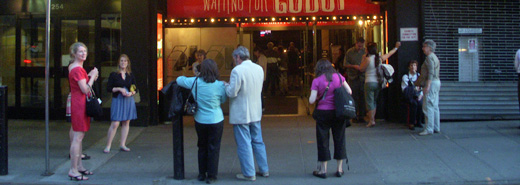Moviegoing: Harry Brown

Possibly because Michael Caine referred repeatedly to Gran Torino in a recent Talk of the Town item, I expected Harry Brown to be a very different picture from the one that I saw this afternoon. The actual movie is far more interesting, more engaging, and even more beautiful. It was vastly less noisy and explosive, and there was none of that “Make my day!” fury that Clint Eastwood gives off like the heat of a sun-baked sedan. The first third — perhaps the first half — of Harry Brown is extraordinarily quiet, right out there with the meditations of Ingmar Bergman for contained feelings.
Harry Brown becomes a widower early in the movie; a daughter died years ago, in childhood. Harry’s only companion is Len Attwell (David Bradley), another resident of the council estate that has seen better days and that has been terrorized by thugs and drugs. Lynn, whose flat overlooks the subway (underpass) entrance where the boys hang out, has evidently had more than a few rude encounters, culminating in a smoky blob of burning matter pushed through his letterbox. Len tries to enlicit Harry’s support in an unspecified bit of vigilantism, but Harry very calmly tells Len that, when he got married, he boxed up his memories of serving in the Royal Marines in Ulster, and is no longer a fighting man. Exasperated, Len assaults the gang with a bayonet. He does not survive the incident. Harry finds out when DI Alice Frampton (Emily Mortimer) and DS Terry Hicock (Charlie Creed-Miles) pay a call.
The dreariness of these scenes is visually unrelieved, but it is redeemed by Harry’s palpable mindfulness, and by Alice’s not very hopeful conviction that the police ought to do a better job of protecting people like Len. (Alice’s personal gravity makes her almost unsuitable for police work — one can imagine Helen Mirren’s Jane Tennison losing her patience with this woman.) The camera shots are so beautifully composed that they transfigure the sepia-toned environment in which Harry spends his days and nights. Mr Caine is at times part of this decor; his eyes, once scornful pits in a smooth face, brim with a vitality that has nothing to do with “twinkling.”
The violence, once it starts, is both thrillingly imaginative and wholly unpredictable. Suffice it to say that Harry knows how to unbox what he learned in the marines with thorough dispatch.
